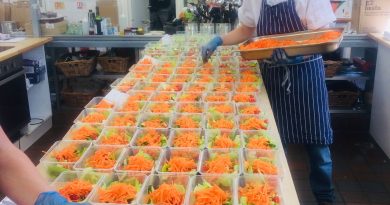Mayor urges Bristol residents to “stay at home”
Bristol Mayor Marvin Rees is urging people to stay at home to slow the spread of coronavirus (COVID-19) and protect vulnerable people in the city.
The city council is working alongside partners, health services, and the voluntary sector to support people across Bristol – including special measures for homeless people.
But the mayor has warned this critical work will be hampered by people not listening to Government advice.
This recommends:
- Avoid social contact
- Work from home if you can
- Don’t use public transport unless you have to
- Do not attend social or extended family gatherings
- Contact your GP or Health service via phone or online
- Only leave your home if you have to – to buy urgent supplies, go to key work, or get fresh air a safe distance from others.
Pubs, clubs, gyms, cinemas and theatres should now have all closed, and restaurants and cafes should only be providing takeaway or delivery.
But Mr Rees says despite this clear advice, people are continuing to congregate in areas of Bristol including outside pubs, in non-essential shops and in playparks.
He says: “The longer people ignore the advice and keep going out, the higher the chance that more people will get coronavirus. Catching the virus will prove fatal for some people.
“You may be lucky enough not to fall into a high risk group, but not everyone is the same. By ignoring advice to stay inside you are putting lives at risk. We have many vulnerable people in the city who need us all to pull together to protect them.
“Bristol’s hospitals and healthcare services are under huge pressure. It is everyone’s job to act now to help prevent more people needing medical help. The message is clear, stay home and save lives.”
As of Saturday 21 March, 20 people in Bristol have been reported to have coronavirus.
Bristol City Council Director of Public Health, Christina Gray said: “At the moment only people in hospital are being routinely tested, so if you have symptoms and you are not sure if you have the virus, you may well not find out.
“Therefore it is really important if you or someone you have close contact with displays symptoms to take extra precautions and self-isolate at home.
“The common symptoms to look out for are a new continuous cough and/or a high temperature.
“If you have these symptoms stay at home for seven days. If you live with other people it is likely you will infect each other or be infected already. Staying at home for 14 days will greatly reduce the overall amount of infection the household could pass on to others in the community.”
The most common symptoms of coronavirus are recent onset of:
- a high temperature – this means you feel hot to touch on your chest or back (you do not need to measure your temperature)
- a new, continuous cough – this means coughing a lot for more than an hour, or 3 or more coughing episodes in 24 hours (if you usually have a cough, it may be worse than usual)
As well as staying home, there are general principles you can follow to help prevent the spread of coronavirus, including:
- washing your hands more often – with soap and water for at least 20 seconds or use a hand sanitiser when you get home or into work, when you blow your nose, sneeze or cough, eat or handle food
- avoid touching your eyes, nose, and mouth with unwashed hands
- avoid close contact with people who have symptoms
- cover your cough or sneeze with a tissue, then throw the tissue in a bin and wash your hands
- clean and disinfect frequently touched objects and surfaces in the home.
More information about social distancing is available online and in multiple languages at: https://www.gov.uk/government/publications/covid-19-guidance-on-social-distancing-and-for-vulnerable-people





